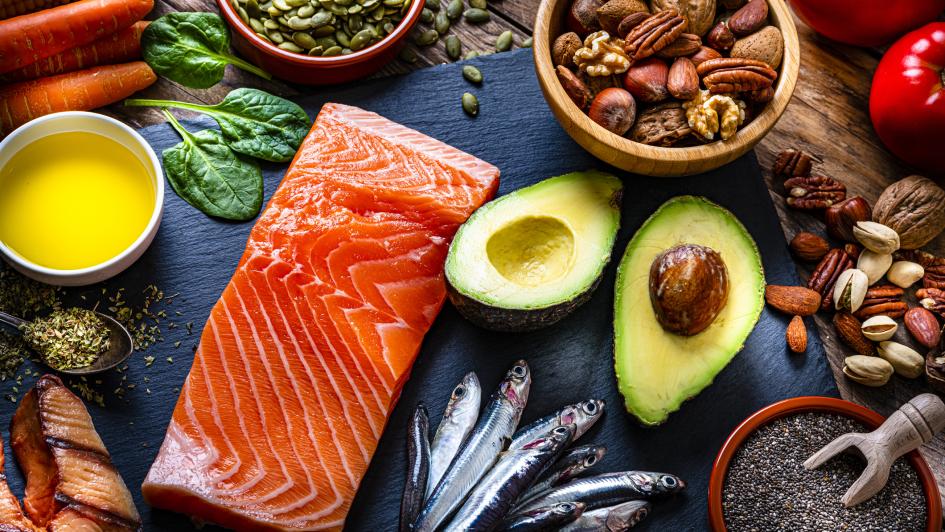Food to Reduce Symptoms of Anxiety

Published
The struggle is real for people with anxiety. Approximately 40 million people suffer from anxiety disorders in the US, that’s a whopping 19% of the population.1
Anxiety can range from mild symptoms to debilitating generalized anxiety disorder, panic attacks, phobias, and social anxiety. It’s difficult to diagnose anxiety because it’s usually masked by other health issues such as insomnia, fatigue, substance misuse, digestive issues, heart palpitations, headaches, muscle tension, or chronic pain. Below are three ways that nutrition may help reduce symptoms of anxiety:
Magnesium
Magnesium plays an important role in regulating chemical messengers called neurotransmitters that are needed for relaxation and relieving muscle tension.2,3,4 Diets low in magnesium may be linked to increased anxiety and sleep issues.5 Many people don’t eat enough magnesium in their diet due to refining of grains and a general low intake of plant-based foods. Foods that are high in magnesium are leafy greens, avocado, nuts, seeds, whole grains, legumes, and dark chocolate.
Omega-3 fatty acids
This category of fats decreases inflammation and support brain health. Inflammation of the brain may be a factor in anxiety and other mood disorders.6,7 Foods high in omega-3’s include fatty fish (wild salmon, tuna, black cod, anchovies, and sardines), walnuts, and seeds (flax, hemp, and chia). Aim for eating fatty fish at least 2-3 times per week or ¼ cup of walnuts and 1-2 Tbsp of flax, hemp, or chia seeds daily. Fish is the preferred source compared to vegetarian sources if possible.
Fermented Foods
Probiotic-rich foods increase the beneficial bacteria in our intestines. Poor gut health is related to mental health disorders including anxiety.8 Our microbiome is made of bacteria and other probiotic organisms that naturally inhabit our digestive system. Eating certain probiotics increases the synthesis of GABA, a neurotransmitter that reduces anxiety and fear.8 Fermented foods include yogurt, kefir, and traditionally fermented sauerkraut, kimchi, miso, pickles, and kombucha.
Nutrition can be a powerful part of your holistic treatment plan. To optimize your intake of magnesium, omega-3’s, and fermented foods, reach out to Bastyr Center for Natural Health to schedule an appointment with one of our Registered Dietitians at (206) 834-4100. Happy healing friends!
Reference List
1. Any Anxiety Disorder. National Institute of Mental Health. Accessed November 8, 2021. https://www.nimh.nih.gov/health/statistics/any-anxiety-disorder
2. Kirkland AE, Sarlo GL, Holton KF. The Role of Magnesium in Neurological Disorders. Nutrients. 2018;10(6):730. doi:10.3390/nu10060730
3. Lakhan SE, Vieira KF. Nutritional and herbal supplements for anxiety and anxiety-related disorders: systematic review. Nutr J. 2010;9:42. doi:10.1186/1475-2891-9-42
4. Boyle NB, Lawton C, Dye L. The Effects of Magnesium Supplementation on Subjective Anxiety and Stress-A Systematic Review. Nutrients. 2017;9(5):429. doi:10.3390/nu9050429
5. Sartori SB, Whittle N, Hetzenauer A, et al. Magnesium deficiency induces anxiety and HPA axis dysregulation: modulation by therapeutic drug treatment. Neuropharmacology. 2012;62(1):304-312. doi:10.1016/j.neuropharm.2011.07.027
6. Su KP, Tsang PT, Lin P, et al. Association of use of omega-3 polyunsaturated fatty acids with changes in severity and anxiety symptoms. JAMA Netw Open. 2018;1(5). doi: 10.1001/jamanetworkoprn.2018.2327
7. Kiecolt-Glaser JK, Belury MA, Andridge R, Malarkey WB, Glaser R. Omega-3 supplementation lowers inflammation and anxiety in medical students: a randomized controlled trial. Brain Behav Immun. 2011;25(8):1725-1734. doi:10.1016/j.bbi.2011.07.229
8. Teng M, Hao J, Lai-Yu K, Zhihong S, et al. Probiotic consumption relieved human stress and anxiety symptoms possibly via modulating the neuroactive potential of the gut microbiota. Neurobiology of Stress. 2021; 100294(14):1-10. https://doi.org/10.1016/j.ynstr.2021.100294.

